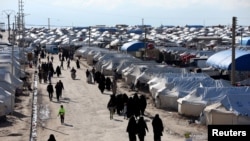The International Committee of the Red Cross is calling for the repatriation of families of foreign fighters suspected of being allied with Islamic State militants in Syria.
More than 70,000 people fled to Al Hol camp after Syrian government troops regained control of Islamic State's last stronghold of Deirel-Zour. This population includes more than 11,000 family members of suspected IS fighters from dozens of countries.
ICRC's director for the Near and Middle East region, Fabrizio Carboni, said hundreds of thousands of people in Al Hol and the surrounding area are being kept in a legal limbo in an unstable, disputed place.
"Even for a state, it is difficult to manage a population like this one. Hundreds of thousands of people who spent the last months, if not years, under the bombs-starved, wounded, sick, traumatized. I mean it is just apocalyptical," he said.
'Stigmatized and categorized'
Carboni said people seen as related to IS are stigmatized and categorized as good victims or bad victims. He said this even extends to the children, most under age 12, who comprise two-thirds of Al Hol's population. He calls this wholesale stigmatization a form of collective punishment.
He agrees the question of repatriating IS fighters is politically toxic. He notes many states are reluctant to bring back their nationals, even children, because of perceived security risks. But he said it is unconscionable and immoral to think of children in conflict as perpetrators and not as victims.
"Some of those states have for decades defended in various fora that kids are victims and cannot be considered as combatants, for instance. And, today, the very same states are reluctant to take those kids back. It does not look good," he said.
Carboni warns that states will at some point pay a high price for failure to address this issue.
He said allowing people to fester in abysmal conditions with no end in sight is likely to result in further radicalization. He said stigmatizing such a large population is not the best way to reconcile and stabilize communities.




